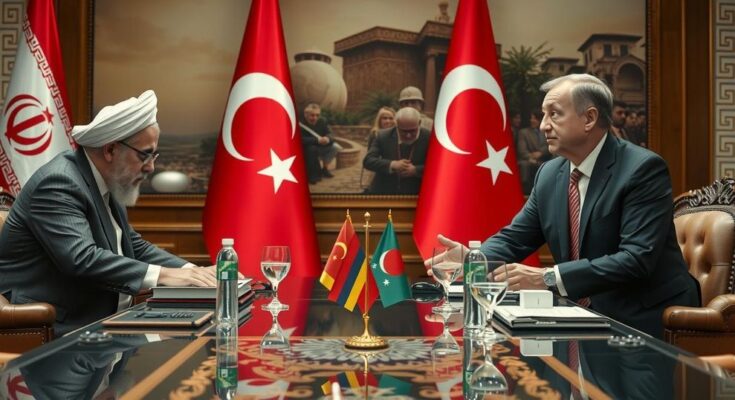Egypt hosted a summit of the Developing-8, featuring Turkish President Recep Tayyip Erdogan and Iranian President Masoud Pezeshkian. The summit highlights the shifting power dynamics in the Middle East, with growing influence from non-Arab nations amid continuing conflicts, including the war in Gaza and rivalry with Iran-backed groups.
On Thursday, Egypt hosted a significant summit of the Developing-8 (D-8), bringing together the presidents of Turkey and Iran amid ongoing geopolitical turmoil in the Middle East. Set in Egypt’s New Administrative Capital, this gathering highlights the increasing influence of non-Arab nations, such as Turkey and Iran, in the region’s affairs. This summit marks the first meeting between Turkish President Recep Tayyip Erdogan and Iranian President Masoud Pezeshkian since recent changes in the Syrian political landscape, particularly the overthrow of President Bashar Al Assad’s regime, supported by Iran and its allies.
The geopolitical landscape is notably shifting as Iranian-backed groups, including Hamas and Hezbollah, have faced setbacks in their confrontations with Israel. Anis Salem, a retired Egyptian diplomat, commented, “The weight and influence of the Arab Middle East is waning and the centres of power in the region are shifting to non-Arab players like Turkey, Iran and Israel.”
Furthermore, discussions at the summit will address the ongoing violence in Gaza and the impacts of attacks in the Red Sea linked to the Houthis, an Iranian ally. Egypt’s President Abdel Fattah El Sisi is anticipated to advocate for the cessation of these assaults, which have adversely affected Egypt’s economic stability, particularly its revenues from the Suez Canal. Additionally, Egypt has sought assurances regarding the Houthis’ military intentions in the strategic Bab Al Mandeb Strait.
The summit also reflects Egypt’s efforts to normalize relations with Iran, which have remained strained following the Islamic revolution of 1979. Despite ongoing dialogue, the two nations have yet to elevate their diplomatic ties to an ambassadorial level, indicative of lingering tensions. The summit’s agenda underscores the growing collaboration between Turkey and Egypt, particularly in light of their joint efforts to stabilize relations after years of rivalry and conflict in regional proxy wars.
The Developing-8 Organization for Economic Co-operation was established in 1997 to enhance cooperation among its member states, which include Nigeria, Pakistan, Bangladesh, Indonesia, Malaysia, in addition to Turkey and Iran. The D-8 summit serves as a crucial platform for dialogue and collaboration among Muslim-majority nations at a time when traditional regional power dynamics are shifting. The involvement of Turkey and Iran demonstrates the rising influence of non-Arab states in Middle Eastern affairs, especially in light of recent conflicts, including the ongoing Gaza violence and the Syrian civil war. Egypt’s role in these discussions is pivotal given its strategic position and historical involvement in Middle Eastern politics.
This summit of the Developing-8 reflects the evolving geopolitical landscape of the Middle East, with non-Arab nations like Turkey and Iran gaining prominence. The gathering denotes an important phase in regional diplomacy, particularly as Egypt seeks to strengthen its position and address critical issues such as security in the Red Sea and the ramifications of ongoing conflicts in Gaza and Lebanon. Additionally, Egypt’s efforts to normalize relations with Iran showcase the complex interplay of diplomacy amidst historical tensions.
Original Source: www.thenationalnews.com




